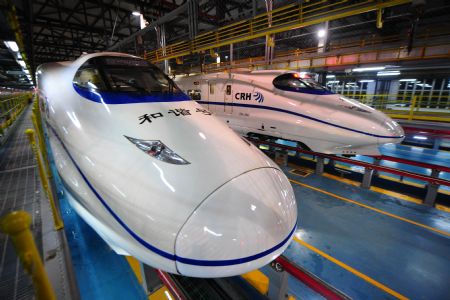Wuhan-Guangzhou bullet train link to hit airlines hard
![A bullet train runs on the Wuhan-Guangzhou high-speed railway on Thursday.[Zhou Chao/China Daily] A bullet train runs on the Wuhan-Guangzhou high-speed railway on Thursday.[Zhou Chao/China Daily]](http://images.china.cn/attachement/jpg/site1007/20091226/0011432100f50c9fb42403.jpg) |
| A bullet train runs on the Wuhan-Guangzhou high-speed railway on Thursday. [Zhou Chao/China Daily] |
Competition between airlines and rail operators will further hot up on Saturday thanks to the launch of China's longest high-speed train link between Wuhan and Guangzhou.
The line stretches more than 1,000 km and will slash the travel time from Wuhan, Hubei province, to Guangzhou in Guangdong from 10 hours to just three.
Tickets for the service - which also stops at Changsha, capital of Hunan - went on sale at new stations in the three cities last weekend, with prices ranging from 780 yuan (US$110) for first class to 490 yuan for second class, said a joint document released by the National Development and Reform Commission and the Ministry of Railways.
The link, on which trains will reach a top speed of 350 km/h, is expected to pose a real threat to airlines running flights linking the cities.
"High-speed rail has three advantages over air travel: it is more convenient, more punctual and has a better safety record. This could help erode the airlines' market shares," said Si Xianmin, chairman of China Southern Airlines, the largest domestic airline by fleet size.
From today's launch, 38 out of China Southern Airlines' 160-plus domestic flights will compete with high-speed train links, he said.
A similar service opened on April 1 between Wuhan and Hefei, Anhui province, had already grabbed half of the passengers traveling from Wuhan to Shanghai, said Si.
The Shijiazhuang to Taiyuan link, also opened on April 1, caused sales for China Eastern Airlines' Beijing to Taiyuan flight to slump 36 percent the following day, while private Spring Airlines reduced its Shanghai to Zhengzhou flights due to competition from the Shanghai bullet trains, Beijing News reported.
To deal with this threat, China Southern Airlines last week unveiled several counter measures, including cutting ticket prices from Wuhan to Guangzhou by almost half for advanced purchases.
The company also signed a deal with airports in Wuhan and Changsha to give priority to flights to Guangzhou to ensure punctuality.
If railway chiefs over-cut the number of low-cost tickets on slower trains, as they did when the country's first high-speed link opened between Beijing and Tianjin last year, the airlines could win more passengers with cheap offers, said Zhao Jian, professor with Beijing Jiaotong University.
"But whichever side wins, passengers will be the ultimate winner," he said.
Wu Wenhua, a researcher with the National Development and Reform Commission's comprehensive transport institute, said developing high-speed rail networks is in line with the demand for high-efficiency, low-emissions transport.
China plans to have high-speed rail services running between 70 percent of key cities by 2020, which would cover more than 80 percent of the airline network.
About 16,000 km of railway for 350-km/h trains will be built on the mainland in the next 10 years, according to a blueprint by the Ministry of Railways. By 2012, work will be completed on 42 high-speed links covering 13,000 km, the blueprint showed.
 |
| Two high-speed trains stop at the high-speed railway maintenance base in Wuhan, capital of central China's Hubei Province, Dec. 22, 2009. This base is one of the four high-speed train maintenance bases in China. The Wuhan-Guangzhou high-speed railway, a 1,068.6-kilometer passenger rail line linking Wuhan and Guangzhou, capital of south China's Guangdong Province, will be formally opened on Dec. 26. [Cheng Min/Xinhua] |
 0 Comments
0 Comments







Comments